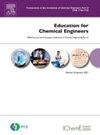Active learning in environmental engineering: Combining interactive platforms and project-based approaches to boost engagement and academic performance
IF 2.3
2区 教育学
Q1 EDUCATION, SCIENTIFIC DISCIPLINES
引用次数: 0
Abstract
This work examines the application of active learning methodologies, including interactive platforms and project-based learning (PBL), in the subject “Bases de la Ingeniería Ambiental” (Fundamentals of Environmental Engineering, FEE) at the Universidad Autónoma de Madrid. Over five academic years (2019/20–2023/24), student response systems (SRSs) such as Kahoot! and Edpuzzle were implemented to foster participation and improve conceptual understanding through gamified quizzes and video-based problem-solving. Additionally, PBL was introduced to promote hands-on learning, teamwork, and critical thinking. The intervention involved approximately 130 students per academic year. Comparative analysis of academic performance showed an increase in average final grades from 4.81 (pre-intervention period) to 5.62 in the two most recent academic years, along with higher scores in continuous assessment activities. Student satisfaction indicators remained consistently high, with institutional surveys showing no negative deviations even during pandemic-related disruptions. Professors reported a positive perception of the methodology, highlighting improved student engagement without loss of control over class dynamics. These findings support the value of combining SRS tools and PBL as a robust framework to enhance motivation and academic achievement in environmental engineering education.
环境工程中的主动学习:结合互动平台和基于项目的方法来提高参与度和学习成绩
这项工作研究了马德里大学Autónoma环境工程基础课程中主动学习方法的应用,包括互动平台和基于项目的学习(PBL)。在五个学年(2019/20-2023/24)中,学生响应系统(srs),如Kahoot!和Edpuzzle的实施是为了通过游戏化的测验和基于视频的问题解决来促进参与和提高概念理解。此外,引入PBL以促进实践学习,团队合作和批判性思维。每学年约有130名学生参与干预。学业成绩对比分析显示,最近两个学年的平均期末成绩从4.81分(干预前)提高到5.62分,在持续的评估活动中得分也有所提高。学生满意度指标一直很高,机构调查显示,即使在与大流行有关的中断期间,也没有出现负面偏差。教授们报告了对这种方法的积极看法,强调在不失去对课堂动态控制的情况下,提高了学生的参与度。这些发现支持将SRS工具和PBL结合起来作为一个强大的框架来提高环境工程教育的动机和学术成就的价值。
本文章由计算机程序翻译,如有差异,请以英文原文为准。
求助全文
约1分钟内获得全文
求助全文
来源期刊

Education for Chemical Engineers
Multiple-
CiteScore
8.80
自引率
17.90%
发文量
30
审稿时长
31 days
期刊介绍:
Education for Chemical Engineers was launched in 2006 with a remit to publisheducation research papers, resource reviews and teaching and learning notes. ECE is targeted at chemical engineering academics and educators, discussing the ongoingchanges and development in chemical engineering education. This international title publishes papers from around the world, creating a global network of chemical engineering academics. Papers demonstrating how educational research results can be applied to chemical engineering education are particularly welcome, as are the accounts of research work that brings new perspectives to established principles, highlighting unsolved problems or indicating direction for future research relevant to chemical engineering education. Core topic areas: -Assessment- Accreditation- Curriculum development and transformation- Design- Diversity- Distance education-- E-learning Entrepreneurship programs- Industry-academic linkages- Benchmarking- Lifelong learning- Multidisciplinary programs- Outreach from kindergarten to high school programs- Student recruitment and retention and transition programs- New technology- Problem-based learning- Social responsibility and professionalism- Teamwork- Web-based learning
 求助内容:
求助内容: 应助结果提醒方式:
应助结果提醒方式:


